Parvatiya Sahkari Bhaisaj Vikas Evem Kray Vikray Sangh Ltd. Sales ...
Parvatiya Sahkari Bhaisaj Vikas Evem Kray Vikray Sangh Ltd. Sales ...
Parvatiya Sahkari Bhaisaj Vikas Evem Kray Vikray Sangh Ltd. Sales ...
Create successful ePaper yourself
Turn your PDF publications into a flip-book with our unique Google optimized e-Paper software.
VATLaws (Readable Version) - Wednesday, March 06, 2013<br />
[2012] 55 VST 180 (Utk)<br />
[IN THE UTTARAKHAND HIGH COURT]<br />
<strong>Parvatiya</strong> <strong>Sahkari</strong> <strong>Bhaisaj</strong> <strong>Vikas</strong> <strong>Evem</strong> <strong>Kray</strong> <strong>Vikray</strong> <strong>Sangh</strong> <strong>Ltd</strong>.<br />
V.<br />
<strong>Sales</strong> Tax Officer, Khand I, Rishikesh and Others<br />
BARIN GHOSH , C.J. AND DHYANI U.C. , J.<br />
April 25, 2012<br />
HF ♦ Assessee, including dealer (Registered or Unregistered)<br />
TRADE TAX — SALE — ROYALTY — ASSESSEE LICENSED BY FOREST DEPARTMENT TO ENTER<br />
FOREST FOR COLLECTION OF LICHEN TO BE STORED IN DEPARTMENT’S GODOWN AND<br />
TRANSFERRED TO ASSESSEE UPON PAYMENT OF CONSIDERATION INCLUDING ROYALTY AND<br />
TRADE TAX — INTENTION OF PARTIES NOT TO GRANT A RIGHT OR PRIVILEGE BUT TO SELL<br />
COLLECTED LICHEN TO ASSESSEE — ROYALTY NOTHING BUT CONSIDERATION FOR TRANSFER OF<br />
PROPRIETARY RIGHT IN MOVABLE PROPERTY — REOPENING OF ASSESSMENT ON GROUND<br />
ASSESSEE LIABLE ON SUBSEQUENT SALE BY IT AS MANUFACTURER NOT JUSTIFIED — U.P. TRADE<br />
TAX ACT (15 OF 1948).<br />
The petitioner, an association of registered co-operative societies of people, who resided in or around forest<br />
areas was granted a licence by the Forest Department by which permission was granted for the people<br />
associated with the associated co-operative societies of the petitioner, to enter the forest upon deposit of<br />
security, for collection of jhula ghas (a variety of lichen). The jhula ghas so collected were stored in the<br />
warehouse/godown of the State Forest Department and weighed after which the property in such lichen<br />
passed on to the petitioner upon obtaining delivery thereof from the Forest Department and payment of the<br />
consideration therefor, termed as royalty, trade tax and other taxes. The petitioner sold such lichen in the same<br />
condition as it received from the Forest Department not collecting any trade tax in relation thereto. The<br />
petitioner in its returns showed this and it was also accepted by the Department for a few assessment years.<br />
Later, on the ground that the collection of lichen was being done by the assessee upon payment of royalty and,<br />
accordingly, the activity of the assessee in collecting lichen was manufacture/production, requiring the<br />
petitioner to pay trade tax, the case was reopened under section 21(2) of the U. P. Trade Tax Act, 1948 and<br />
assessment orders were passed. The appellate authority upheld the order of assessment and the Tribunal also<br />
upheld the order of the appellate authority. On revision petitions:<br />
Held, allowing the petitions, that the petitioner who was licensed to enter the earmarked forest for the purpose<br />
of collection of lichen, also earmarked for being transferred to the petitioner, was duty bound to collect such<br />
lichen and keep it in the godown of the Forest Department before it was transferred by the Forest Department<br />
to the petitioner upon payment of consideration fixed by the Department. In such circumstances, the intention<br />
of the parties was not to grant a right or privilege to the petitioner, but to make the petitioner work for the<br />
Department to collect lichen on behalf of the Department in order to enable it to transfer the proprietary right<br />
therein to the petitioner upon obtaining appropriate consideration in respect thereof. Therefore, though the<br />
word “royalty” was used, it was nothing but consideration for transfer of proprietary right in the movable<br />
property of lichen upon payment of consideration fixed by the Forest Department. Knowing that it was a<br />
consideration for transfer of proprietary right in the movable property of lichen by the Forest Department to the<br />
petitioner, the Forest Department, as duty bound, charged trade tax as it was liable under the U.P. Trade Tax<br />
Act. Therefore the original assessment orders which were sought to be reopened on the ground that the<br />
petitioner was liable on its subsequent sale as a manufacturer were to be restored.<br />
Gyaneshwar Nath and Brothers v. Commissioner of <strong>Sales</strong> Tax [1998] 1 UPTC 618 (para 4) and State of H.P. v.<br />
Gujarat Ambuja Cement <strong>Ltd</strong>. [2005] 142 STC 1 (SC) (para 5) referred to.<br />
This copy was printed from VATLaws licensed to: R.S. Goyal
VATLaws (Readable Version) - Wednesday, March 06, 2013<br />
Commercial Tax Revision Nos. 3, Commercial Tax Revision Nos. 4, Commercial Tax Revision Nos.<br />
5, Commercial Tax Revision Nos. 6, Commercial Tax Revision Nos. 7, Commercial Tax Revision<br />
Nos. 8, Commercial Tax Revision Nos. 9, Commercial Tax Revision Nos. 10, Commercial Tax<br />
Revision Nos. 11, Commercial Tax Revision Nos. 12, Commercial Tax Revision Nos. 13,<br />
Commercial Tax Revision Nos. 14 of 2010 decided on April 25, 2012<br />
S.K. Posti and B.S. Negi for the petitioner<br />
K.P. Upadhyaya, Additional Chief Standing Counsel, for the respondent<br />
Cases referred to :<br />
Gyaneshwar Nath and Brothers v. Commissioner of <strong>Sales</strong> Tax [1998] 1 UPTC 618 referred to<br />
State of H.P. v. Gujarat Ambuja Cement <strong>Ltd</strong>. [2005] 142 STC 1 (SC) referred to<br />
--------------------------------------------------<br />
JUDGMENT 1<br />
The judgment of the court was delivered by<br />
BARIN GHOSH C.J.—We have considered the averments made in the<br />
applications for condonation of delay in preferring these revision applications<br />
and, being satisfied with the reasons furnished therein, allow the<br />
applications for condonation of delay and, thereby, condone the delay in<br />
preferring these revision applications.<br />
The revisionist, in these revision applications, is an association of<br />
registered co-operative societies of people, who reside in or around forest<br />
areas. On a licence granted by the Forest Department to the revisionist,<br />
people associated with the associated co-operative societies of the revisionist<br />
enter the forest permitted to be entered by such licence upon<br />
deposit of a sum of Rs. 10,000, as and by way of security, for the purpose of<br />
collection of jhula ghas (a variety of lichen). The licence, thus granted by<br />
the Forest Department, permits those people to collect such lichen with<br />
obligation to store the same in the warehouse/godown of the Forest<br />
Department of the State. The Forest Department of the State, thereupon,<br />
weighs such lichen and makes the same over to the revisionist upon the<br />
revisionist paying consideration therefor, termed as royalty, trade tax and<br />
other taxes. The property in such lichen passes on to the revisionist upon<br />
obtaining delivery thereof from the Forest Department after making<br />
payment of the consideration as mentioned above. The revisionist, thereupon,<br />
sells such lichen in the same condition as it receives from the Forest<br />
Department in the manner indicated above. In relation to such sale, no<br />
trade tax is collected by the revisionist. The revisionist, in its returns to the<br />
Department, held out so and the same was also accepted by the Trade Tax<br />
Department for a few of the assessment years. Later, at one point of time, it<br />
transpired that the assessee is selling such lichen at a very high price than<br />
the price of acquisition of the same. The assessing authority felt that the<br />
assessee must be adding value to lichen obtained by it from the Forest<br />
Department. After being convinced that the revisionist is not doing so, it<br />
felt that the collection of lichen is being done by the assessee upon payment<br />
of royalty and, accordingly, the activity of the assessee in collecting<br />
lichen is manufacture/production requiring the revisionist to pay trade tax.<br />
The Department, accordingly, re-opened the case under section 21(2) of<br />
the U.P. Trade Tax Act.<br />
The show-cause notice was not replied by the revisionist, nor the revi-<br />
This copy was printed from VATLaws licensed to: R.S. Goyal
VATLaws (Readable Version) - Wednesday, March 06, 2013<br />
sionist appeared before the assessing officer on the date fixed for hearing.<br />
1 Oral.<br />
Page No: 182<br />
The assessing officer, taking note of the fact that it was the assessee, who<br />
was collecting lichen from the earmarked forest and paying royalty on the<br />
basis of weight of removed lichen, held that the licensee was carrying out<br />
manufacturing/production activity and one of the cost thereof was royalty<br />
and that, therefore, when such produce was sold by the revisionist, Trade<br />
Tax Act required the revisionist to pay trade tax thereon.<br />
Against the assessment orders, appeals were preferred. The appellate<br />
authority also proceeded on the basis that it was the assessee, who was<br />
collecting lichen and, for that purpose, as was required, was also paying<br />
royalty. On that premise and by noting a judgment of the learned single<br />
judge of the honourable Allahabad High Court rendered in the case of<br />
Gyaneshwar Nath and Brothers v. Commissioner of <strong>Sales</strong> Tax reported in<br />
[1998] 1 UPTC 618 (All), upheld the order of assessment. In that case, in<br />
the revision application filed by the assessee, the order of the Tribunal,<br />
remitting the matter back to the assessing authority to ascertain whether<br />
tendu leaves dealt with by the assessee were being purchased by the assessee<br />
from the Forest Department or the same were being collected by the<br />
assessee from the forest on being licensed to do so having been declared<br />
the highest bidder in an auction, was challenged. The honourable court<br />
held that, where the material on record is not sufficient to take an effective<br />
decision in one way or the other in a given case and a further enquiry is<br />
called for, the concerned authority or the court may set aside the matter in<br />
exercise of its power of remand directing a fresh order after the necessary<br />
inquiry is made. Holding thus, the honourable court dismissed the revision<br />
application. In the circumstances, the conclusion would be that the said<br />
judgment had no relevance to the questions that were required to be gone<br />
into by the appellate authority.<br />
The revisionist, then, approached the Tribunal, when the Tribunal also<br />
upheld the order of the appellate authority based on the said judgment of<br />
the honourable Allahabad High Court and also a judgment of the<br />
honourable Supreme Court rendered in the case of State of H.P. v.<br />
Gujarat Ambuja Cement <strong>Ltd</strong>. reported in [2005] 142 STC 1 (SC); [2005] 6<br />
SCC 499, and also proceeding on the basis that the privilege to collect<br />
lichen having been parted with in consideration of payment of royalty,<br />
which is not purchase price, the revisionist was liable to pay trade tax<br />
whether trade tax was or was not collected on the royalty.<br />
In view of the pronouncement made by the honourable Supreme Court<br />
in the case referred to above, there cannot be any dispute that royalty is not<br />
the purchase price. Royalty is consideration for grant of a right or a<br />
privilege. Therefore, in the instant case, in the event a concession to enter<br />
the jungle to collect lichen was granted by the Forest Department, then of<br />
course, what the Forest Department charged was in fact royalty; but, if the<br />
Forest Department intended to transfer lichen, though collected by the<br />
revisionist, but on account of the Forest Department, then, the Forest<br />
Department never intended to part with any privilege. It only intended to<br />
This copy was printed from VATLaws licensed to: R.S. Goyal<br />
Page No: 183
VATLaws (Readable Version) - Wednesday, March 06, 2013<br />
sell collected lichen to the revisionist, though collection of such lichen<br />
would be made by the revisionist on behalf of the Forest Department.<br />
The facts as above, which are not in dispute, suggest that the Forest<br />
Department licensed the revisionist, upon deposit of security money of<br />
Rs. 10,000, to enter the earmarked forest for the purpose of collection of<br />
lichen, which was also earmarked for being transferred to the revisionist;<br />
but the revisionist was duty bound to collect such lichen, keep the same in<br />
the godown of the Forest Department before the same was transferred by<br />
the Forest Department to the revisionist upon payment of an agreed consideration.<br />
In such circumstances, the intention of the parties was not to<br />
grant a right or privilege to the revisionist, but to make the revisionist work<br />
for the Forest Department to collect lichen for and on behalf and for the<br />
use of the Forest Department in order to enable the Forest Department to<br />
transfer the proprietary right therein to the revisionist upon obtaining<br />
appropriate consideration in respect thereof. In the circumstances, the conclusion<br />
would be that, though the word "royalty" was used in the instant<br />
case, in fact, the same was nothing but consideration for transfer of<br />
proprietary right in the movable property of lichen upon payment of<br />
consideration fixed by the Forest Department. Knowing that it was a consideration<br />
for transfer of proprietary right in the movable property of lichen<br />
by the Forest Department to the revisionist, the Forest Department, as duty<br />
bound, charged trade tax as it was liable to do under the U.P. Trade Tax<br />
Act.<br />
We, accordingly, allow the revision applications, set aside the judgment<br />
and order of the Tribunal as well as of the appellate authority and the<br />
assessing authority, and restore the original assessment orders, which were<br />
sought to be re-opened under section 21(2) of the U.P. Trade Tax Act and<br />
also set aside those assessment orders, which have been passed on<br />
premises contrary to what has been stated above and direct the assessment<br />
thereof on the basis of the pronouncement as above.<br />
Page No: 184<br />
This copy was printed from VATLaws licensed to: R.S. Goyal


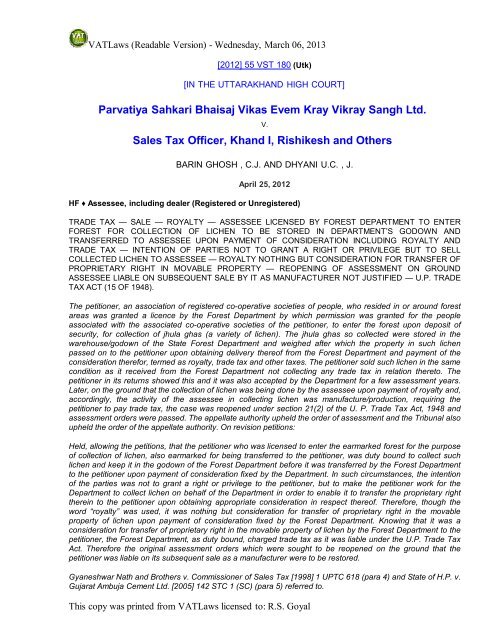
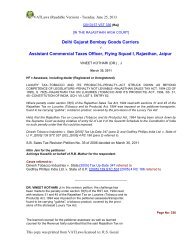
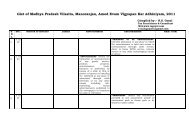
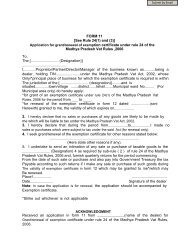
![levy of tax under vat 9b an stamp duty simultaneously[1] - RS Goyal ...](https://img.yumpu.com/45559052/1/158x260/levy-of-tax-under-vat-9b-an-stamp-duty-simultaneously1-rs-goyal-.jpg?quality=85)
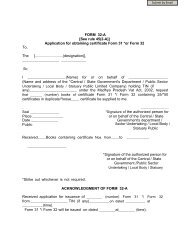
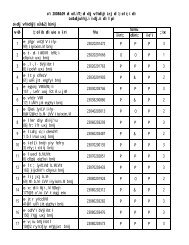
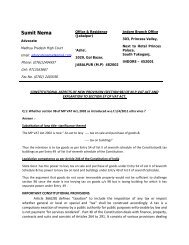
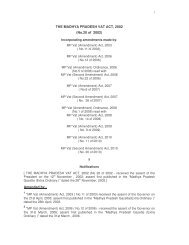
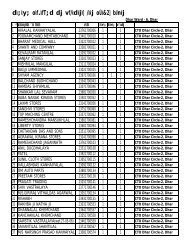
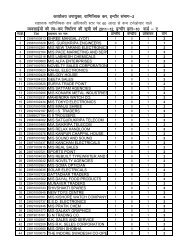
![[2012] 54 VST 26 (P and H) - RS Goyal & Associates](https://img.yumpu.com/38348208/1/190x245/2012-54-vst-26-p-and-h-rs-goyal-associates.jpg?quality=85)
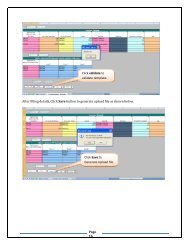
![[2012] 47 vst 116 (cestat) - RS Goyal & Associates](https://img.yumpu.com/38348091/1/190x245/2012-47-vst-116-cestat-rs-goyal-associates.jpg?quality=85)
![[2012] 47 VST 379 (Ker) - RS Goyal & Associates](https://img.yumpu.com/38348087/1/190x245/2012-47-vst-379-ker-rs-goyal-associates.jpg?quality=85)